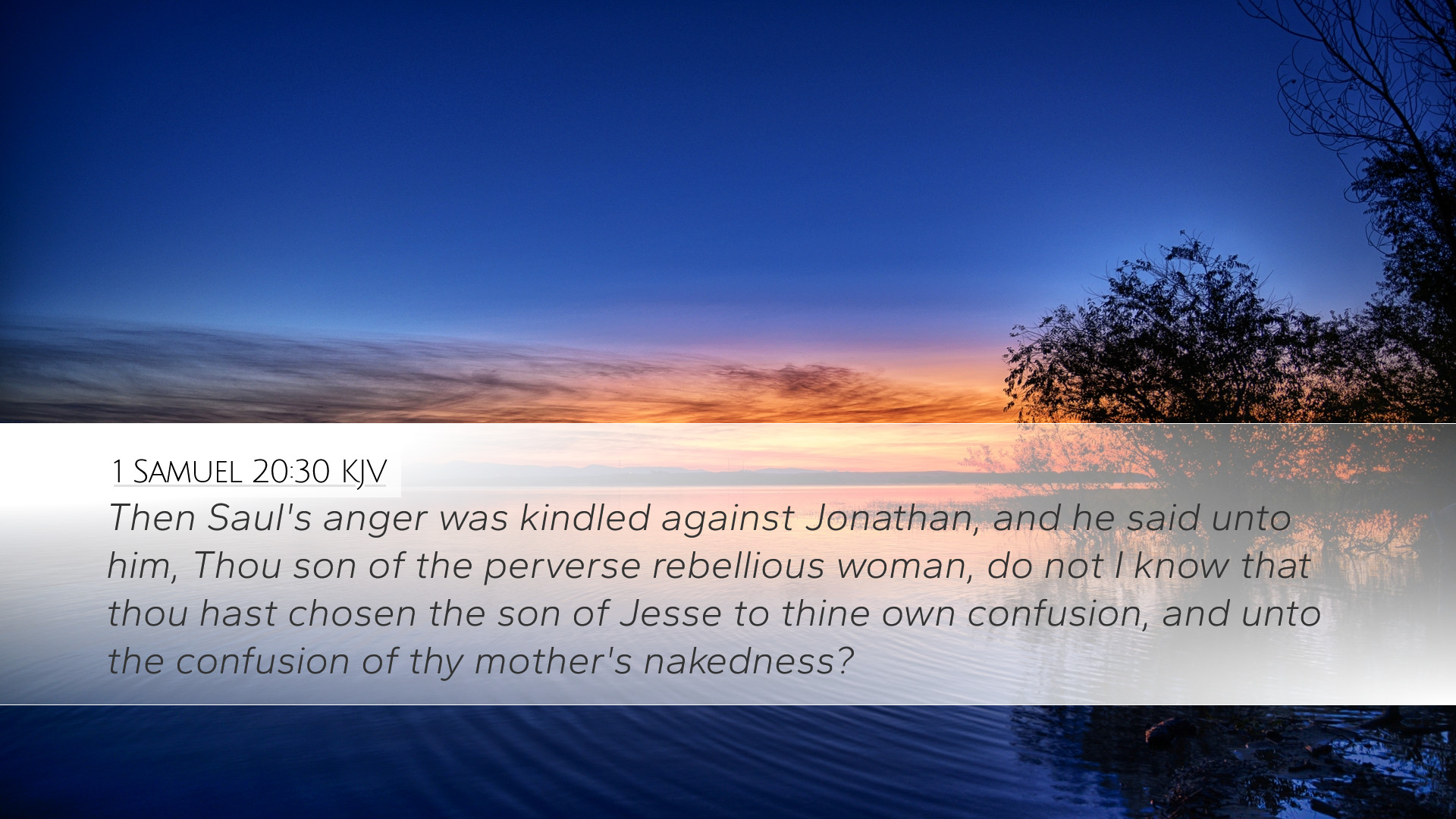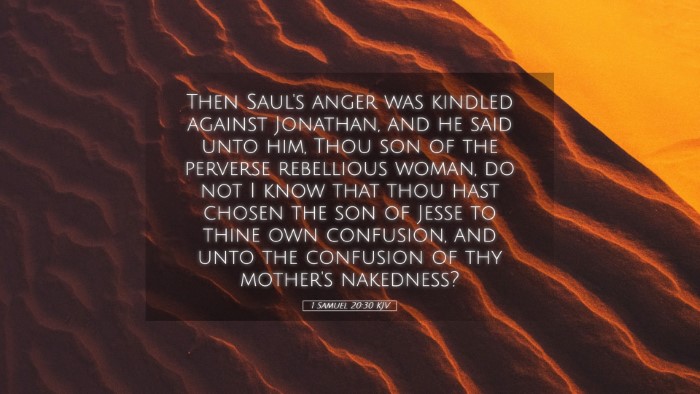Commentary on 1 Samuel 20:30
The verse 1 Samuel 20:30 reads:
"Then Saul's anger was kindled against Jonathan, and he said unto him, Thou son of the perverse rebellious woman, dost not I know that thou hast chosen the son of Jesse to thine own confusion, and unto the confusion of thy mother's nakedness?"
Contextual Analysis
This moment in Scripture unveils the strained relationship between King Saul and his son Jonathan amidst the backdrop of rising conflict with David, the future king of Israel. This relationship is pivotal and laden with emotional gravity, as Saul's jealousy culminates in a fierce confrontation with Jonathan.
Saul's Anger
Matthew Henry offers insights into the transformative nature of Saul's anger. It is emblematic of a deeper spiritual and emotional turmoil within the king. Saul's anger is not merely a reaction to Jonathan's alliance with David, but also an expression of his own failed kingship and the impending loss of authority.
Albert Barnes elaborates that Saul's ire reveals his deteriorating mental state. This passage exemplifies the tragic trajectory of one who, once chosen by God, succumbs to the powers of jealousy and rage. Barnes emphasizes the irony of Saul’s public accusations against Jonathan, which reflect his own failings rather than those of his son.
Descriptive Language
Saul's description of Jonathan as the "son of the perverse rebellious woman" carries heavy connotations.
Adam Clarke interprets this phrase to highlight Saul's desperation in discrediting Jonathan. This personal attack indicates a breakdown in familial bonds, showcasing how fear and envy can twist familial love into hostility.
Understanding 'the Son of Jesse'
The reference to David as "the son of Jesse" serves multiple functions in this verse. It not only signifies David's lowly beginnings but also serves as a marker of Saul's misplaced anger.
Henry posits that Saul’s focus on David underscores his inability to see that Jonathan's loyalty stems from a higher moral ground rather than rebellion against his father.
Confusion and Nakedness
The expression "to thine own confusion, and unto the confusion of thy mother's nakedness" contains profound implications regarding honor and family integrity.
Barnes points out that Saul's use of such language attempts to publicly humiliate Jonathan by suggesting that his actions undermine the very identity and honor of their family lineage. This is a desperate move crafted through Saul's misperception of loyalty and betrayal.
Clarke adds that such language indicates a kinship torn apart, where familial love is eclipsed by the dynamics of jealousy and strife. The family unit, which should represent support and sanctity, is instead a stage for Saul's psychological decline and Jonathan's painful loyalty.
Theological Implications
This confrontation is ripe with theological implication, specifically regarding the themes of divine sovereignty and human agency.
Henry suggests that Saul's anger leads us to reflect on the nature of God’s will; it reveals how human decisions affected by sin can result in tragic consequences within familial and communal settings.
Furthermore, the dynamics between Jonathan, Saul, and David can be seen as a microcosm of the larger conflict of good versus evil, and the inevitable transition of power ordained by God, which looks beyond human frailty and failures.
Lessons for Today
In conclusion, this passage speaks volumes to today's church leaders, theologians, and committed believers. The narrative underscores the importance of loyalty, the struggle against sin, and the realities of relational conflicts.
Barnes highlights that one should remain steadfast in faith despite familial or societal pressure to conform. It encourages us to foster relationships that align with God’s truth rather than succumbing to the chaos of jealousy and pride.
As we reflect on these messages, let us consider how we can foster healthier spiritual relationships and respond to conflict with grace, echoing Jonathan’s loyalty and integrity in the midst of his father's rage.
Conclusion
The confrontation in 1 Samuel 20:30 provides profound insights into human nature, power struggles, and divine providence. By studying this passage, we not only engage with the historical context but also are challenged to evaluate our own lives in light of commitment, integrity, and the prioritization of God’s will over personal conflicts.


